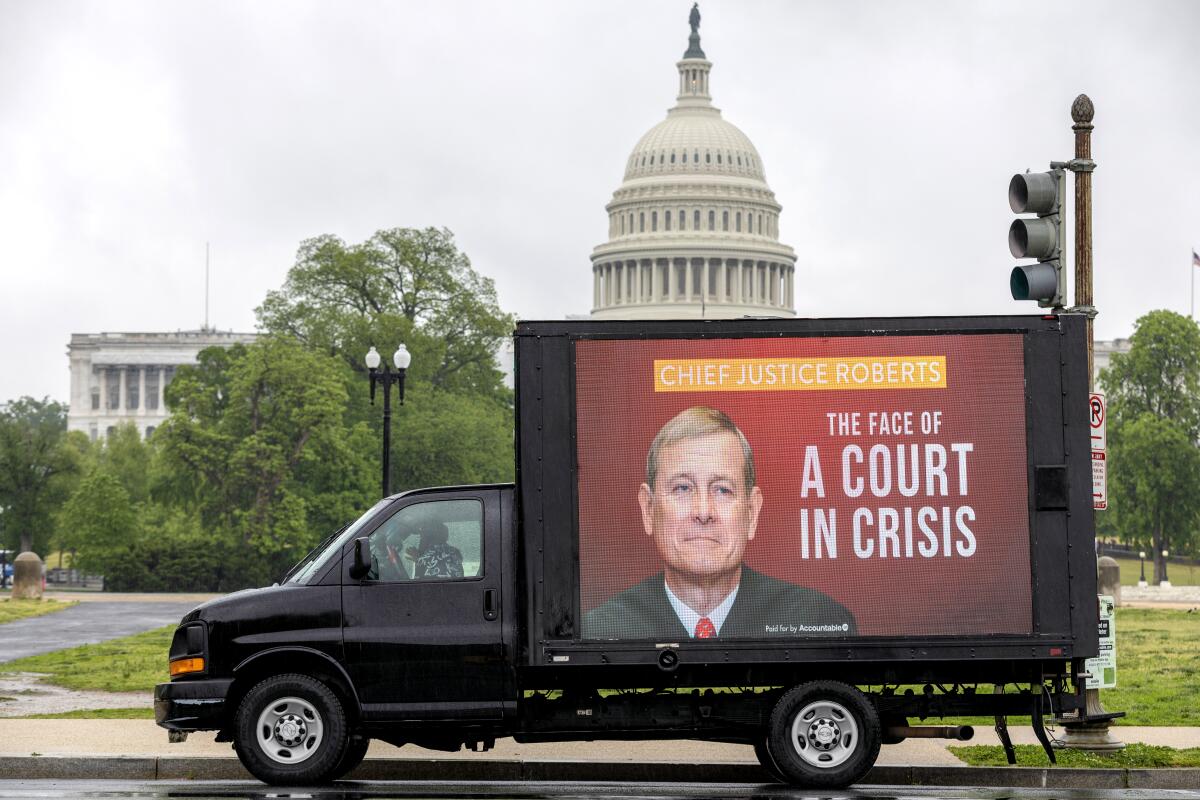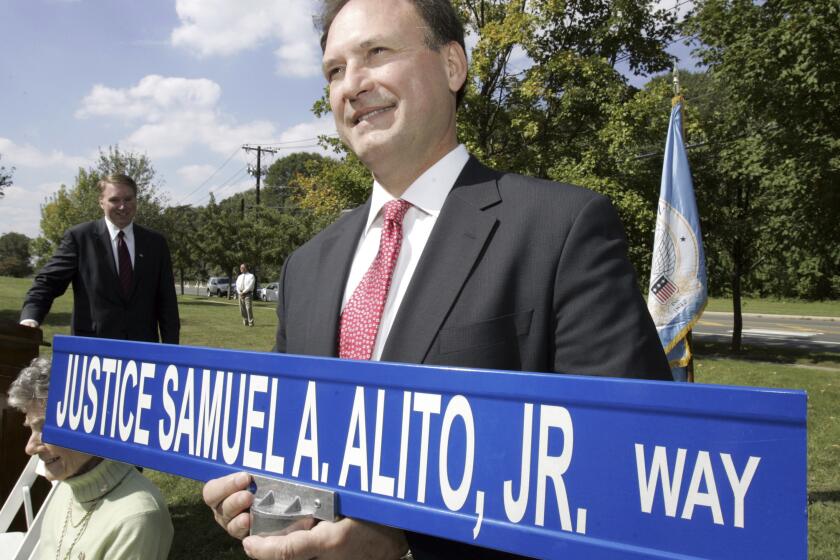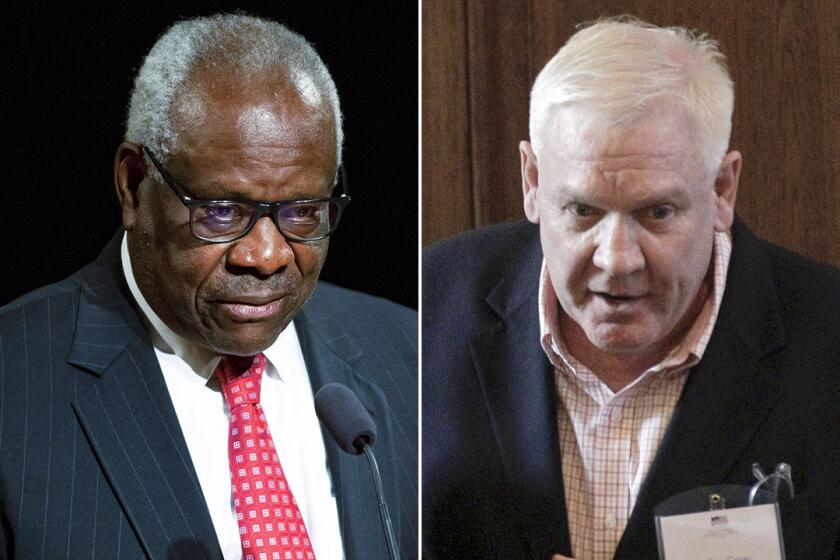Please don’t offer to fly me to Alaska in exchange for a plug in my column

- Share via
Why do some United States Supreme Court justices have such a hard time saying no?
Believe me, I understand the temptation. Columnists may not be judges in the traditional sense, but we are judges in the court of public opinion. Occasionally, I’ve been offered gifts in exchange for a positive ruling (well, a positive column) on a controversial issue that may come before me.
Attractive as these offers may be, they are just not that difficult to refuse. Especially when the institution’s credibility — or your job — is on the line.
The people judges and journalists serve expect and deserve transparency, fairness and independence. They do not want either group to be bought off, or materially rewarded for the opinions they deliver. If the public stops believing the courts or the news media are acting on principle, the institutions lose credibility. Even the whiff of a conflict of interest or a quid pro quo diminishes them. Accepting costly freebies on the sly from interested parties, then pretending it’s no one’s business, is one of the fastest ways to corrode faith in our democratic infrastructure, our free press, our supposedly fair and impartial Supreme Court.
It’s astonishing that newspapers like The Times are stricter about ethics than the Supreme Court, which is required to report some financial dealings each year but otherwise has no compulsory code of ethics at all.
No one has ever offered me a free flight on a private jet to a rustic lodge in Alaska, as in the case of Supreme Court Justice Samuel A. Alito Jr., or a free seat on a private jet to a super yacht in Indonesia, as in the case of Justice Clarence Thomas. But I’ve been offered lots of nice things in my career.
The conservative who wrote fiery opinions overturning Roe vs. Wade and dissenting on LGBTQ+ rights can’t stand criticism for his free fishing trip or anything else.
When I was a cub reporter in Ventura County, the owner of an oceanfront vacation home in Oxnard Shores offered me the use of his house. The catch? I was working on a story about a proposed moratorium on beachfront residential construction, which he opposed. If he liked the story, he told me, I was welcome to a weekend at the beach. The invitation was rescinded upon publication.
Even when a source doesn’t want anything, when they simply appreciate something you have written, they may try to thank you with a lavish gift. That creates the appearance of impropriety. I have, over the years, sent back a Seiko watch, a gold bracelet, a Blackberry (remember those?) and designer clothing.
I once wrote about the late Ray Evans, the lyricist half of the supremely talented songwriting duo Livingston and Evans. I thought a story about the origins of the great Christmas song “Silver Bells” would be a good read during the holidays, so I arranged to meet Evans for an interview over lunch and when I dropped him off at his Benedict Canyon home, he invited me in.
Justice Antonin Scalia’s impact on the Supreme Court includes forging the way for justices to accept free trips —something that has entangled Clarence Thomas and Samuel A. Alito Jr.
Evans, who was an 89-year-old widower with a naughty streak, invited me downstairs to his bedroom to show me his royalty books. “You’re sure your husband won’t mind?” he joked, as he took a seat on his motorized staircase chair for the descent. In a notebook on his desk, he kept track of the astonishing amount of money he’d earned from that one classic song, more than half a million dollars a year.
The story ran on Dec. 25, 2004. That morning, my home phone rang. It was Evans, delighted by the piece. “I couldn’t have paid a publicist to get such a great story in the paper,” he exclaimed. “I want you to go to Tiffany’s and pick out anything you want.” I wish.
Just this week, I was offered a stay at a lovely little seaside hotel in Laguna Beach in exchange for coverage of the place. That is a newspaper no-no. Would the story be colored by the fact that my stay would not have cost a cent? How could it not be? And why should anyone even have to wonder about that?
Which brings me back to the Supreme Court, which is not bound by the code of conduct that applies to all other federal judges.
ProPublica reported on Thomas’ undisclosed private jet and yacht trips, now it says he failed to disclose real estate transactions. Who will hold him accountable?
If we are ever to regain our trust in the Supreme Court, Congress must adopt a specific and binding code of ethics for the justices, ones that impose well-defined dollar limits on gifts and “personal hospitality,” the dodge that has allowed Thomas, in particular, to feed at the freebie trough.
“The highest court in the land should not have the lowest ethical standards,” Senate Judiciary Committee Chairman Richard J. Durbin (D-Ill.) said as he announced that his committee would take up legislation tightening ethics rules for the Supreme Court later this summer.
It’s not just conservative justices who have failed to declare their conflicts. According to reports, Justice Sonia Sotomayor did not recuse herself in at least three cases involving Penguin Random House, which has paid her millions of dollars for her memoir and children’s books.
The idea that the justices can be trusted to police themselves, as all nine declared recently in a joint statement on ethics, is laughable. No one can do that. Human beings are endlessly creative in absolving themselves of conflicts. Alito, for instance, claimed it was OK for him to take a free private jet ride to Alaska because the seat would have been vacant anyway.
In any case, Supreme Court justices shouldn’t have to be responsible for deciding which freebies to accept, or which cases to bow out of.
Let’s remove that terrible burden from their black-robed shoulders. Like journalists, they need some hard and fast rules to live by.
More to Read
A cure for the common opinion
Get thought-provoking perspectives with our weekly newsletter.
You may occasionally receive promotional content from the Los Angeles Times.











